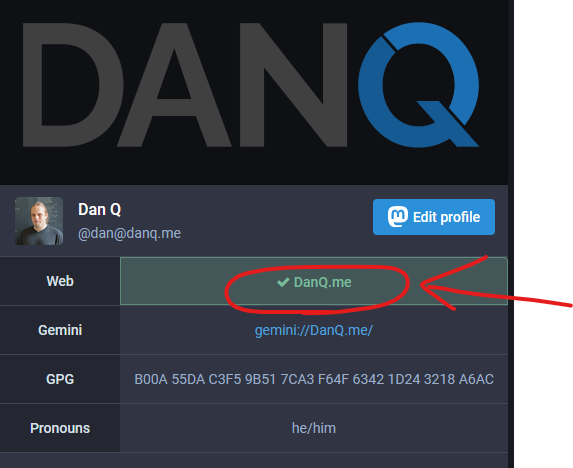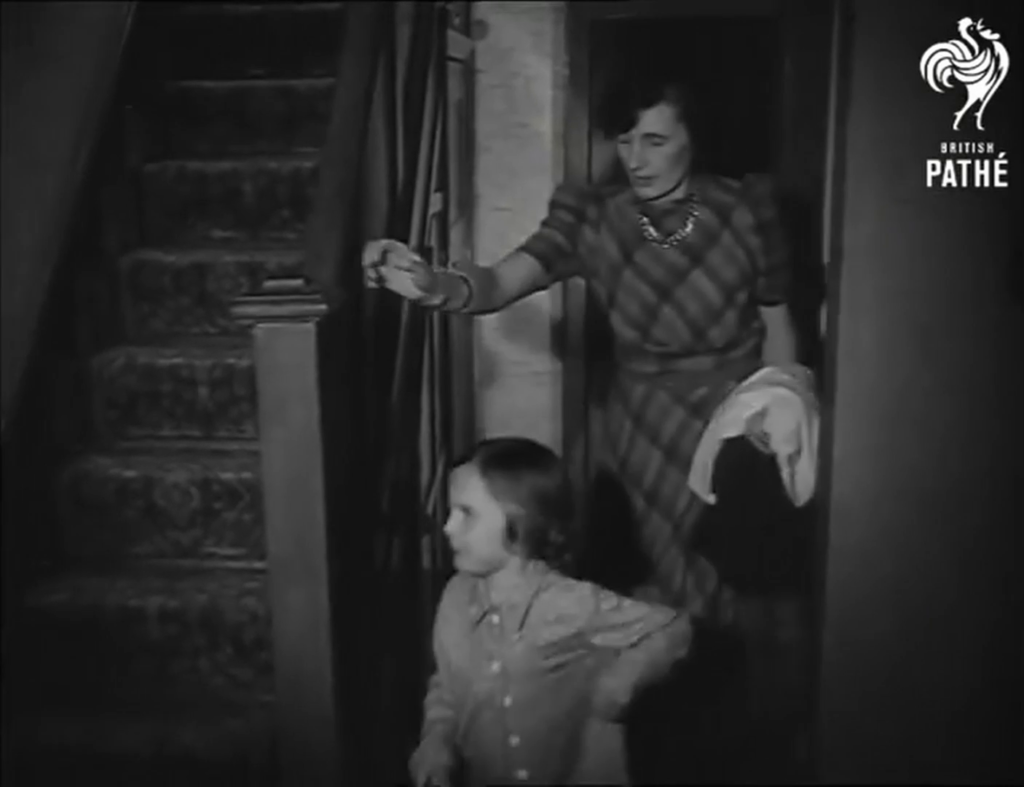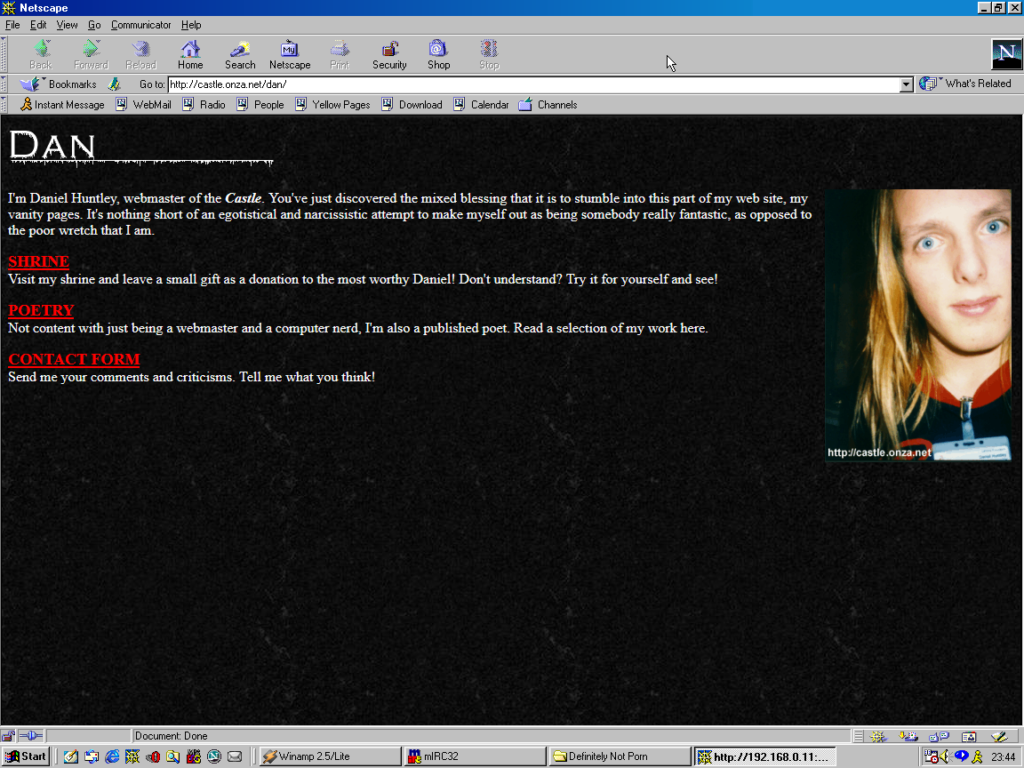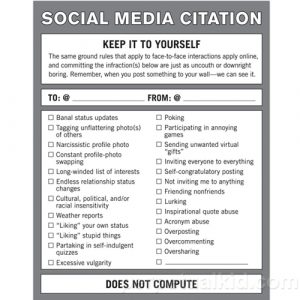Meta are launching Threads tomorrow.
If you’re wondering how this will impact the world and society’s social connections, I direct you to the predictive powers of 1984 British cinema.
Meta are launching Threads tomorrow.
If you’re wondering how this will impact the world and society’s social connections, I direct you to the predictive powers of 1984 British cinema.
This is a reply to a post published elsewhere. Its content might be duplicated as a traditional comment at the original source.
Let’s not sell Mastodon short here. The service you compare it to – Twitter – solves this problem… but only if you trust Twitter as an authority on the identity of people. Mastodon also solves the problem, but it puts the trust in a different place: domain names and account pages.
If you want to “verify” yourself on Mastodon, you can use a rel=”me” link from a page or domain you control. It looks like this:

A great thing about this form of verification is you don’t have to trust my server (and you probably shouldn’t): you can check it for yourself to ensure that the listed website really does state that this is the official Mastodon account of “me”.
You can argue this just moves the problem further down the road – instead of trusting a corporation that have shown that they’re not above selling the rights to your identity you have to trust that a website is legitimate – and you’d be right. But in my case for example you can use years of history, archive.org, cross-links etc. to verify that the domain is “me”, and from that you can confirm the legitimacy of my Mastodon account. Anybody who can spoof multiple decades of my history and maintain that lie for a decade of indepdendent web archiving probably deserves to be able to pretend to be me!
There are lots of other distributed methods too: web-of-trust systems, signed keys, even SSL certificates would be a potential solution. Looking again at my profile, you’ll see that I list the fingerprint of my GPG key, which you can compare to ones in public directories (which are co-signed by other people). This way you’d know that if you sent an encrypted DM to my Mastodon inbox it could only be decrypted if I were legitimately me. Or I could post a message signed with that key to prove my identity, insofar as my web-of-trust meets your satisfaction.
If gov.uk’s page about 10 Downing Street had profile pages for cabinet members with rel=”me” links to their social profiles I’d be more-likely to trust the legitimacy of those social profiles than I would if they had a centralised verification such as a Twitter “blue tick”.
Fediverse identify verification isn’t as hard a problem to solve as Derek implies, and indeed it’s already partially-solved. Not having a single point of authority is less convenient, sure, but it also protects you from some of the more-insidious identity problems that systems like Twitter’s have.
This is a repost promoting content originally published elsewhere. See more things Dan's reposted.
A few months ago, people were posting a lot about the Netherlands on Chinese social media platform Weibo. “Wake up, sleeping people of the Netherlands!” said one post. Others lamented that the people of Amsterdam wanted their tulips back.
These Chinese social media users aren’t expressing a nascent interest in all things Dutch. They’re talking about recent protests over frozen bank deposits in the province of Henan. Ordinarily, discussions about a controversial topic like this would be censored on Chinese social media, and posts containing the word “Henan” could be blocked or deleted. But “Henan” (河南) sounds a lot like “Helan” (荷兰), the Mandarin word for the Netherlands. By swapping the names around, people were able to get past the censors and keep the conversation going.
…
I love this article. The use of homonyms and puns to work around online censorship by Chinese citizens is as innovative and heartwarming as its necessity is horrifying and tragic. If you’re wondering exactly how similar 河南 (“Henan”, the name of the Chinese province in which authorities abused social distancing laws and used violence to prevent rural bank customers from withdrawing their own money) and 荷兰 (“Helan”, The Netherlands) sound, have a listen for yourself:
Unless you speak Mandarin already, you’ll might struggle to even pinpoint which is which in that recording.
This clever and imaginative use of language to try to sidestep surviellance feels like a modern adaptation of cryptolects like Polari or rhyming slang as used in the UK for the same purpose. But writing in Han characters online seems to provide an amazingly diverse way to encode meaning that an in-the-know human can parse, but an automated machine or an uninformed human censor can not. The story about the use of the word for “paratrooper” on Chinese social media, touched upon in the article linked above and expanded elsewhere, is particularly enjoyable.
Anyway, after you’ve read the article and you’re ready for a whole new rabbit whole to explore, I’d like to kickstart you by introducing you to Totoiana, a Pig Latin-like (second-syllable onwards, then first syllable) dialect spoken with fluency exclusively in a single Romanian village, and nobody knows why.
I got lost on the Web this week, but it was harder than I’d have liked.

There was a discussion this week in the Abnib WhatsApp group about whether a particular illustration of a farm was full of phallic imagery (it was). This left me wondering if anybody had ever tried to identify the most-priapic buildings in the world. Of course towers often look at least a little bit like their architects were compensating for something, but some – like the Ypsilanti Water Tower in Michigan pictured above – go further than others.
I quickly found the Wikipedia article for the Most Phallic Building Contest in 2003, so that was my jumping-off point. It’s easy enough to get lost on Wikipedia alone, but sometimes you feel the need for a primary source. I was delighted to discover that the web pages for the Most Phallic Building Contest are still online 18 years after the competition ended!

Link rot is a serious problem on the Web, to such an extent that it’s pleasing when it isn’t present. The other year, for example, I revisited a post I wrote in 2004 and was pleased to find that a linked 2003 article by Nicholas ‘Aquarion’ Avenell is still alive at its original address! Contrast Jonathan Ames, the author/columnist/screenwriter who created the Most Phallic Building Contest until as late as 2011 before eventually letting his site and blog lapse and fall off the Internet. It takes effort to keep Web content alive, but it’s worth more effort than it’s sometimes given.
Anyway: a shot tower in Bristol – a part of the UK with a long history of leadworking – was among the latecomer entrants to the competition, and seeing this curious building reminded me about something I’d read, once, about the manufacture of lead shot. The idea (invented in Bristol by a plumber called William Watts) is that you pour molten lead through a sieve at the top of a tower, let surface tension pull it into spherical drops as it falls, and eventually catch it in a cold water bath to finish solidifying it. I’d seen an animation of the process, but I’d never seen a video of it, so I went about finding one.

British Pathé‘s YouTube Channel provided me with this 1950 film, and if you follow only one hyperlink from this article, let it be this one! It’s a well-shot (pun intended, but there’s a worse pun in the video!), and while I needed to translate all of the references to “hundredweights” and “Fahrenheit” to measurements that I can actually understand, it’s thoroughly informative.
But there’s a problem with that video: it’s been badly cut from whatever reel it was originally found on, and from about 1 minute and 38 seconds in it switches to what is clearly a very different film! A mother is seen shepherding her young daughter off to bed, and a voiceover says:
Bedtime has a habit of coming round regularly every night. But for all good parents responsibility doesn’t end there. It’s just the beginning of an evening vigil, ears attuned to cries and moans and things that go bump in the night. But there’s no reason why those ears shouldn’t be your neighbours ears, on occasion.

Now my interest’s piqued. What was this short film going to be about, and where could I find it? There’s no obvious link; YouTube doesn’t even make it easy to find the video uploaded “next” by a given channel. I manipulated some search filters on British Pathé’s site until I eventually hit upon the right combination of magic words and found a clip called Radio Baby Sitter. It starts off exactly where the misplaced prior clip cut out, and tells the story of “Mr. and Mrs. David Hurst, Green Lane, Coventry”, who put a microphone by their daughter’s bed and ran a wire through the wall to their neighbours’ radio’s speaker so they can babysit without coming over for the whole evening.
It’s a baby monitor, although not strictly a radio one as the title implies (it uses a signal wire!), nor is it groundbreakingly innovative: the first baby monitor predates it by over a decade, and it actually did use radiowaves! Still, it’s a fun watch, complete with its contemporary fashion, technology, and social structures. Here’s the full thing, re-merged for your convenience:
Wait, what was I trying to do when I started, again? What was I even talking about…
It used to be easier than this to get lost on the Web, and sometimes I miss that.
Obviously if you go back far enough this is true. Back when search engines were much weaker and Internet content was much less homogeneous and more distributed, we used to engage in this kind of meandering walk all the time: we called it “surfing” the Web. Second-generation Web browsers even had names, pretty often, evocative of this kind of experience: Mosaic, WebExplorer, Navigator, Internet Explorer, IBrowse. As people started to engage in the noble pursuit of creating content for the Web they cross-linked their sources, their friends, their affiliations (remember webrings? here’s a reminder; they’re not quite as dead as you think!), your favourite sites etc. You’d follow links to other pages, then follow their links to others still, and so on in that fashion. If you went round the circles enough times you’d start seeing all those invariably-blue hyperlinks turn purple and know you’d found your way home.

But even after that era, as search engines started to become a reliable and powerful way to navigate the wealth of content on the growing Web, links still dominated our exploration. Following a link from a resource that was linked to by somebody you know carried the weight of a “web of trust”, and you’d quickly come to learn whose links were consistently valuable and on what subjects. They also provided a sense of community and interconnectivity that paralleled the organic, chaotic networks of acquaintances people form out in the real world.
In recent times, that interpersonal connectivity has, for many, been filled by social networks (let’s ignore their failings in this regard for now). But linking to resources “outside” of the big social media silos is hard. These advertisement-funded services work hard to discourage or monetise activity that takes you off their platform, even at the expense of their users. Instagram limits the number of external links by profile; many social networks push for resharing of summaries of content or embedding content from other sources, discouraging engagement with the wider Web, Facebook and Twitter both run external links through a linkwrapper (which sometimes breaks); most large social networks make linking to the profiles of other users of the same social network much easier than to users anywhere else; and so on.
The net result is that Internet users use fewer different websites today than they did 20 years ago, and spend most of their “Web” time in app versions of websites (which often provide a better experience only because site owners strategically make it so to increase their lock-in and data harvesting potential). Truly exploring the Web now requires extra effort, like exercising an underused muscle. And if you begin and end your Web experience on just one to three services, that just feels kind of… sad, to me. Wasted potential.

It sounds like I’m being nostalgic for a less-sophisticated time on the Web (that would certainly be in character!). A time before we’d fully-refined the technology that would come to connect us in an instant to the answers we wanted. But that’s not exactly what I’m pining for. Instead, what I miss is something we lost along the way, on that journey: a Web that was more fun-and-weird, more interpersonal, more diverse. More Geocities, less Facebook; there’s a surprising thing to find myself saying.
Somewhere along the way, we ended up with the Web we asked for, but it wasn’t the Web we wanted.
This is a reply to a post published elsewhere. Its content might be duplicated as a traditional comment at the original source.
Great advice.
After I got banned from Facebook in 2011 (for using a “fake name”, which is actually my real name) I took a similar line of thinking: I can’t trust Facebook (or Twitter, or Instagram, or whoever else) to be responsible custodians of my content, so I shan’t. Now, virtually all content I create is hosted on my WordPress-powered blog, at my own domain, first and foremost… and syndicated copies may appear on various social media.
In a very few instances I go the other way around, producing content in silos and then copying it back to my blog: e.g. my geocaching/geohashing expeditions are posted first to their respective sites (because it’s easiest and most-practical to do that using their apps, especially “in the field”), but then they get imported into my blog using a custom plugin. If any of these sites closes, deletes my data, adds paid tiers I’m not happy with, or just bans me from my own account… I’m still set.
Backing up all your social content is a good strategy. Owning it all to begin with is an even better one, IMHO. See also: Indieweb.
This is a repost promoting content originally published elsewhere. See more things Dan's reposted.
…
I’ve been changing my relationship to being online.
Some of it is keeping in touch with friends who are fascinated by the same sorts of hybrid creations I am. Friends who build things. Friends in different professional communities. Paying attention when they mention some new discovery or avenue of interest.
Some of it is using an RSS reader to change the cadence and depth of my consumption—pulling away from the quick-hit likes of social media in favor of a space where I can run my thoughts to their logical conclusion (and then sit on them long enough to consider whether or not they’re true).
…
I wish I could get more people to see the value in the “slow Web”. The participatory Web. The creative Web. The personalised Web.
When you use an app to browse a “stream” in most social media, you’re seeing a list of posts curated to keep you watching, keep you seeing adverts, keep you on the app so that as much personal data as possible can be leeched from your behaviour. If it feels satisfying and especially if it feels addictive, the social network has done its job, but don’t be fooled: its job is not to improve social connections – it’s job is to keep you from doing anything else.
You don’t have to use the Web this way. You can subscribe to the content creators and topics that actually interest you. You can get that content on basically any device or medium you like, or across a mixture: want notifications by email? Slack? IRC? Discord? In a browser? In an app? As-it-happens or digests? You can filter for what interests you most at any given moment, save content for later, and resharing is supported thanks to an old-school invention called a “URL“. And you’ll see fewer ads and experience less misuse of your behavioural data.
Sure, there’s a learning curve. But it’s worth it. I wish I could get more people to see that.
I’m happy to see that Lucy Belwood does.
This is a repost promoting content originally published elsewhere. See more things Dan's reposted.
Mark Zuckerberg says regulators and governments should play a more active role in controlling internet content.
In an op-ed published in the Washington Post, Facebook’s chief says the responsibility for monitoring harmful content is too great for firms alone.
He calls for new laws in four areas: “Harmful content, election integrity, privacy and data portability.”
It comes two weeks after a gunman used the site to livestream his attack on a mosque in Christchurch, New Zealand.
“Lawmakers often tell me we have too much power over speech, and frankly I agree,” Mr Zuckerberg writes, adding that Facebook was “creating an independent body so people can appeal our decisions” about what is posted and what is taken down.
…
An interesting move which puts Zuckerberg in a parallel position to Bruce Schneier, who’s recently (and especially in his latest book) stood in opposition to a significant number of computer security experts (many of whom are of the “crypto-anarchist” school of thought) also pushed for greater regulation on the Internet. My concern with both figureheads’ proposals comes from the inevitable difficulty in enforcing Internet-wide laws: given that many countries simply won’t enact, or won’t effectively enforce, legislation of the types that either Zuckerberg nor Schneier suggest, either (a) companies intending to engage in unethical behaviour will move to – and profit in – those countries, as we already see with identity thieves in Nigeria, hackers in Russia, and patent infringers in China… or else (b) countries that do agree on a common framework will be forced to curtail Internet communications with those countries, leading to a fragmented and ultimately less-free Internet.
Neither option is good, but I still back these proposals in principle. After all: we don’t enact other internationally-relevant laws (like the GDPR, for example) because we expect to achieve 100% compliance across the globe – we do so because they’re the right thing to do to protect individuals and economies from harm. Little by little, Internet legislation in general (possibly ignoring things like the frankly silly EU cookie regulation and parts of the controversial new EU directives on copyright) makes the Internet a safer place for citizens of Western countries. There are still a huge number of foreign threats like scammers and malware authors as as well as domestic lawbreakers, but increasing the accountability of large companies is, at this point, a far bigger concern.
This is a repost promoting content originally published elsewhere. See more things Dan's reposted.
This is a repost promoting content originally published elsewhere. See more things Dan's reposted.
Now that Google+ has been shuttered, I should air my dirty laundry on how awful the project and exec team was.
I’m still pissed about the bait and switch they pulled by telling me I’d be working on Chrome, then putting me on this god forsaken piece of shit on day one.
This will be a super slow burn that goes back many years. I’ll continue to add to over the next couple of days. I’ll preface it with a bunch of backstory and explain what I had left behind, which made me more unhappy about the culture I had come into.
I spent most of my early career working for two radical sister non-profit orgs. I was the only designer working on anywhere from 4-5 different products at the same time. All centered around activism and used by millions of people.
It’s how I cut my teeth. Learned to be the designer that I am today. Most importantly, the people I worked for are imho some of the greatest people on the planet. Highly intelligent, empathetic, caring, and true role models for a young me. I adore them.
You might not know who they are, but if you’re reading this then you have definitely seen their work. Maybe OpenCongress, or Miro, or maybe Amara which is Vimeo’s partner transcription service. Definitely Fight for the Future, our internet defenders, which was shortly after me.
I married the love of my life in 2008, started a family, and at some point realized that I simply needed to make a better living. No matter how prolific, non-profits usually can’t provide the type of income that you need for a growing family with huge ambitions.
So as I gained visibility – via @dribbble – I started to field recruiters and consider new opportunities. Mostly little startups. I interviewed at one (Rockmelt) and they passed on me (hi, @iamxande ?).
Got an email from Kickstarter (hi, @amotion ?). Schlepped to New York and wasted days of time to be passed on by their founders. Then they unfollowed me on twitter. At least I ate some deli. ?
Then Google reached out. I remember that ”holy shit” moment. “Me!? Are they kidding?? The schmuck who tested out of high school and dropped out of college??” They told me I’d interview to work on Chrome. I was over the moon. I remember Manda tearing up. God I love her.
They gave me a little bit of time for a design exercise. You can see it here in all it’s dated glory: morganallanknutson.com/google/ Click and hold for the overlay. More schlepping from LA and an interview at their silly college-like campus. I was a nervous wreck.
The process felt very haphazard. At one point a front-end dev with a bow-tie grilled me on CSS and asked some super dumb questions. My advocate (a sweetheart named Peter) seemed to be rushing people through, quelling their fears. I still appreciate his belief in me to this day.
I felt like I had done ok. The last two interviews that I failed at were real shots to the heart. I took this one incredibly seriously. I wanted this job so badly. I wanted to prove I was worthy.
Weeks went by and I heard nothing. I accepted the inevitable and started responding to other recruiters. It was ok. I wasn’t joining the big leagues. I could play triple-A ball for longer. As long as I got up to SF where the opportunities were.
I took a gig with a failing news startup (lol) called Ongo (hi, @bethdean ?). They got me up here. I guess it was a bit of a Hail Mary for them. In a couple of months I knocked out more work than they could have built in a year with their eng team. Then…
Google got back in touch almost 3-4 months after the interview (who does this??).
I got the job.
To be continued…
…
If you ever thought that Google+, despite its laudable aims, was rolled out like a shitstorm… image what it must have been like behind the scenes. Actually, image no more – read this thread for a taste of the full horror.
This is a repost promoting content originally published elsewhere. See more things Dan's reposted.
…
On a blog, I can write about blogging and whimsically toss in self-indulgent pictures of May’s budding azaleas.
I can end my career, right here, in a flash. I can rant about the perfidy and corruption of my local governing party, who I devoutly hope are about to be turfed by the voters. I can discuss the difference between O(1) and O(log(N)), which can usually be safely ignored.
On blogs, I can read most of the long-form writing that’s worth reading about the art and craft of programming computers. Or I can follow most of the economists’ debates that are worth having. Or I can check out a new photographer every day and see new a way of seeing the world.
Having said that, it seems sad that most of the traffic these days goes to BigPubs. That the advertising dollars are being sucked inexorably into Facebook/Google and away from anyone else. That these days, I feel good over a piece that gets more than twenty thousand reads (only one so far this year).
…
When I wrote about 20 years of blogging, this was the kind of thing I meant when I talked about why it’s important, to me. But Tim says it better.
This is a repost promoting content originally published elsewhere. See more things Dan's reposted.
As somebody who likes to keep his content on his own server (y’know: right here!) but whose readers sometimes prefer that it’s syndicated to e.g. Facebook (as it is), I appreciate this comic by The Oatmeal.
This is a repost promoting content originally published elsewhere. See more things Dan's reposted.
Disclaimer: I do not build database engines. I build web applications. I run 4-6 different projects every year, so I build a lot of web applications. I see apps with different requirements and different data storage needs. I’ve deployed most of the data stores you’ve heard about, and a few that you probably haven’t. I’ve picked the wrong…
The story of how the Diaspora social network adopted the hip new database technology without for a moment thinking about whether it was the right database technology.

Sometimes it’s really like we’re living in the future. Exciting new technologies keep appearing, and people just keep… using them as if they’d always been there. If tomorrow we perfected the jetpack, the flying car, and the silver jumpsuit, I’ll bet that nobody would think twice about it.
Recently, I’ve had two occasions to use Google+ Hangouts, and I’ve been incredibly impressed.
The first was at Eurovision Night 2012, which was quite a while ago now. Adam did a particularly spectacular job of putting together some wonderful pre-Eurovision entertainments, which were synched-up between our two houses. Meanwhile, he and I (and Rory and Gareth and occasionally other people) linked up our webcams and spare screens via a Google+ hangout, and… it worked.
It just worked. Now I know that the technology behind this isn’t new: back in 2004, I upgraded the Troma Night set-up in Aberystwyth to add a second webcam to the Troma Night live feed. But that was one-way, and we didn’t do sound (for lack of bandwidth and concerns about accidental piracy of the soundtracks to the movies we were watching, of all things, rather than for any particularly good reason). But it really did “just work”, and we were able to wave at each other and chat to each other and – mostly – just “share in the moment” of enjoying the Eurovision Song Contest together, just like we would have in person when we lived in the same town.
At the weekend, I was originally supposed to be in Lancashire, hanging out with my family, but owing to a series of unfortunate disasters (by the way; I’m walking with a stick right now – but that’s not interesting enough to be worth blogging about), I was stuck in Oxford. Despite torrential rain where I was, Preston was quite sunny, and my family decided to have a barbeque.

I was invited… via Google+. They didn’t have Internet access, so they used a mobile dongle plugged into a laptop. I connected in from my desktop computer and then – later – from my mobile phone. So yes, this was at times a genuine mobile-to-mobile multi-party video conference, and it was simple enough that my mother was able to set it up by herself.
Like I said: living in the future.
As I’m sure you’re aware, Saturday marks the final of the 2012 Eurovision Song Contest, the musical highlight of the year. You may also know that there’s been a long tradition among our group of friends to have a Eurovision Party to mark the ocassion, generally hosted by Adam. If you’ve somehow missed this event, then here’s some background reading that might help you understand how it came to be what it is: me, 2005; Liz, 2005; Paul, 2005; Adam, 2006; Adam, 2007 (1); me, 2007; Adam, 2007 (2); Matt R, 2007; Adam on Paul’s blog, 2008; Adam, 2008; Adam, 2010; Adam, 2011; me, 2011. Like I said… a long history.
For the last few years, though, the population of Aberystwyth has been dwindling, and Adam’s parties have turned from an immense hard-to-squeeze-everybody-in ordeal to a far more civilised affair. While simultaneously, groups of ex-Aberystwyth people (like those of us down in Oxford, and those who are up in the North) have been having their own splinter satellite parties.
And you know what? I miss doing Eurovision Night with you guys. So this year, we’re going to try to bring Eurovision Night back to its roots… with technology!

Here’s where the parties are at, this year:
If you’re one of the usual crew, or one of our newer friends, come on over and join the party! Or if you’re going to be watching from further North (Liz? Simon? Gareth? Penny? Matt? Matt? Kit? Fi?), let me know so that I can bring you in on my proposals for “sharing the experience”, drawing together our votes, and whatnot.
And regardless of whether you’ll be joining one of these parties in person, or not, I hope you’ll be joining The Party at Adam’s and The Party on New Earth digitally. If you’re among the 17 people who are actually on Google+, come and join us in our Hangout! Dust off that old webcam and point it at you or your little party, make sure you’re in Adam or I’s “circles”, and then log in on Eurovision Night and join us via the power of the Internet! You’ll have to provide your own crisps and beer, and (unless you’re at Adam’s) you’ll need to bake your own cupcakes with adorable European-flag icing, too, but at least you can be part of the moment with the rest of us.
See you online!
I see that Facebook is experimenting with allowing you to pay a nominal fee to make sure that your posts end up “highlighted” over those of your friends’ other friends. That’s a whole new level of crazy… or is it?

I’m not on Facebook, but I think that this is a really interesting piece of news. The biggest thing that makes Facebook unusable (and which also affects Twitter) is that people will post every little banal thing that comes to their mind. I don’t care what you’re eating for your lunch. I don’t want to read the lyrics of some song that must have been written for you. I really can’t stand your chain messages (for a while there, after I hadn’t received any by email for a few years, I hoped that they’d died out… but it turns out that they just moved to Facebook instead). If you’re among my friends, I know that you have some pretty smart and interesting things to say… but unless I’m willing to spend hours sifting through the detritus it’s buried in, I’ll never find it.

But this might work. If the price sweet spot can be found, and it’s marketed right, then this kind of feature might make services like Facebook more tolerable. When you’re writing about a cute picture of the cat you’ve seen, that’s fine. And when you write something I might care about, you can tick the “this is actually relevant” box. You’ll have to pay a few pence, but at least you know I’ll see it. And if I want to churn through reams of “X likes Chocolate” (who doesn’t?) and “Y is… in a queue for the bus” then I can turn off the “only relevant things” mode and waste some time.
The problem is that the sweet spot will vary from person to person, and there’s no way to work around that. Big Bucks Bob can probably afford to pay a couple of pounds every time he wants to push some meme photo to the top of your feed, but Poor Penniless Penny can’t even justify ten pence to make sure that all of her friends hear about her birthday party.

It’s a pity that it won’t work, because a part of me is drawn to the idea that economic theory can help to improve the signal-to-noise ratio in our information-saturated lives. Turning my attention to email: of all the cost-based anti-spam systems, I was always quite impressed with Hashcash (which Microsoft seem to be reinventing with their Penny Black project). The idea is that your computer does some hard-to-do (but easy-to-verify) computational work for each and every email that it sends. But in its own way, Hashcash has a similar problem to Facebook’s new system: the ability to pay of a sender is not directly proportional to their relevance to the recipient. If my mother wants to send me an email from her aging smartphone, should she have to wait for several minutes while it processes and generates an “e-stamp”, just because – if it were made any faster – spammers with zombie networks of computers could do so too easily?
Yes, I just equated your social network status, about what you ate for your lunch, with spam. If you don’t like it, don’t share this blog post with your friends.
hashcash token: 1:20:120511:https://danq.me/2012/05/11/pay-to-post/::UVHo081pj6bSDWkI:00000000000001sxI